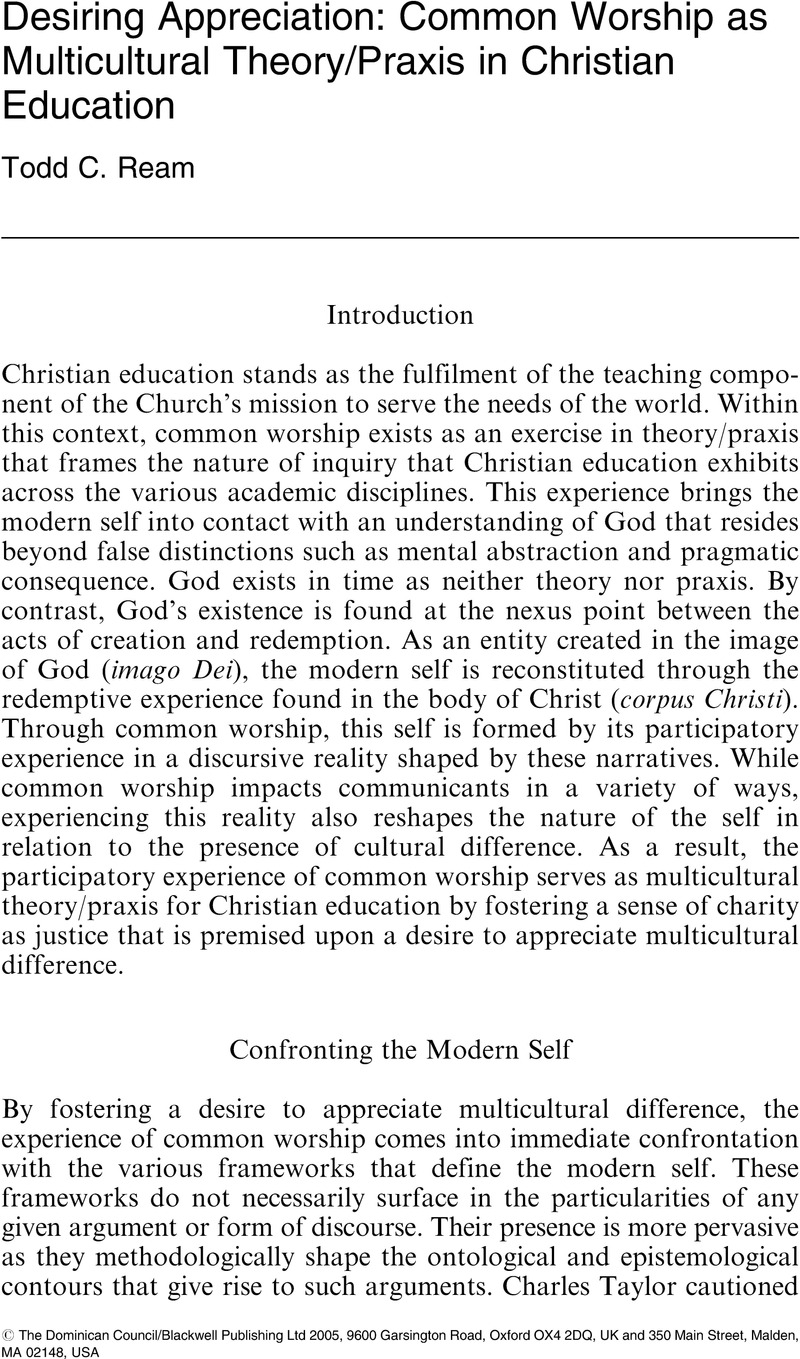No CrossRef data available.
Article contents
Desiring Appreciation: Common Worship as Multicultural Theory/Praxis in Christian Education
Published online by Cambridge University Press: 01 January 2024
Abstract

- Type
- Original Articles
- Information
- Copyright
- Copyright © The Dominican Council/Blackwell Publishing Ltd 2005, 9600 Garsington Road, Oxford OX4 2DQ, UK and 350 Main Street, Malden, MA 02148, USA
References
1 Taylor, Charles, Sources of the Self(Cambridge, MA: Harvard University Press, 1989): 17Google Scholar.
2 Charles Taylor, Sources of the Self, 17.
3 Descartes, René, Meditations on First Philosophy, ed. and trans. Heffernan, George (Notre Dame, IN: University of Notre Dame Press, 1990): 105CrossRefGoogle Scholar.
4 Bacon, Francis, Novum Organum, eds. and trans. Urbach, Peter and Gibson, John (Chicago: Open Court, 1994): 225Google Scholar.
5 Locke, John, An Essay Concerning Human Understanding, ed. Nidditch, Peter H. (New York: Oxford University Press, 1979): 51Google Scholar.
6 Dupré, Louis, Passage to Modernity(New Haven, CN: Yale University Press, 1993): 142Google Scholar.
7 Martin, Bill, “Multiculturalism: Consumerist or Transformational?” in Theorizing Multiculturalism, ed. Willett, Cynthia (New York: Blackwell Publishers, 1998): 128Google Scholar.
8 Bill Martin, “Multiculturalism: Consumerist or Transformational?,” 128.
9 Rawls, John, Political Liberalism(New York: Columbia University Press, 1996): 30Google Scholar.
10 John Rawls, Political Liberalism, 194.
11 Martin, “Multiculturalism: Consumerist or Transformational?,” 128.
12 Sandel, Michael J., Democracy's Discontent(Cambridge, MA: The Belknap Press of Harvard University Press, 1996): 128Google Scholar.
13 Michael J. Sandel, Democracy's Discontent, 100.
14 Sandel, Michael J., Liberalism and the Limits of Justice(New York: Cambridge University Press, 1998): 181CrossRefGoogle Scholar.
15 Wittgenstein, Ludwig, Philosophical Fragments, ed. Anscombe, G.E.M. (Englewood Cliffs, NJ: Prentice Hall/Macmillan, 1953): 8Google Scholar.
16 The Bible: Revised Standard Version(Nashville: Thomas Nelson, 1971)Google Scholar: Old Testament 1.
17 Bonhoeffer, Dietrich, Creation and Fall, trans. Fletcher, John C. (New York: The Macmillan Company, 1965): 38Google Scholar.
18 Dietrich Bonhoeffer, Creation and Fall, 37.
19 Dietrich Bonhoeffer, Creation and Fall, 39.
20 The Bible: Revised Standard Version, New Testament 149.
21 Chrysostom, John, The Homilies of Saint John Chrysostom, Volume VII, trans. Members of the English Church (Oxford, England: John Henry Parker, 1941): 370Google Scholar.
22 Pickstock, Catherine, “Liturgy, Art, and Politics” 159–180 in Modern Theology, 16 no.2 (2000): 160CrossRefGoogle Scholar.
23 Catherine Pickstock, “Liturgy, Art, and Politics,” 160.
24 Catherine Pickstock, “Liturgy, Art, and Politics,” 160.
25 Graham Ward. Cities of God(New York: Routledge, 2000): 176.
26 Milbank, John. Theology and Social Theory(Cambridge, MA: Basil Blackwell, 1995): 423Google Scholar.
27 Graham Ward. Cities of God, 175.
28 Milbank, John and Pickstock, Catherine. Truth in Aquinas(New York: Routledge, 2000): 111Google Scholar.
29 Pickstock, Catherine. After Writing(Malden, MA: Blackwell, 1998): 267Google Scholar.
30 Aquinas, Thomas. Summa Theologiae, ed. McDermott, Timothy (Westminster, MD: Christian Classics, 1991): 351Google Scholar.
31 Long, D. Stephen. Divine Economy(New York: Routledge, 2000): 235Google Scholar.


